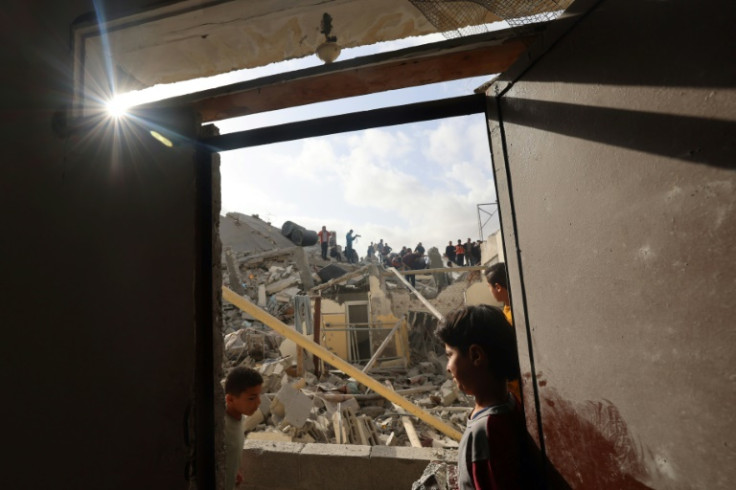Bodies Found At Gaza Hospital As Israel Vows To 'Increase Pressure' On Hamas

Gaza's civil defence said Sunday dozens of bodies had been found buried at a hospital complex previously raided by Israel, as Prime Minister Benjamin Netanyahu vowed to ramp up military pressure on Hamas.
Netanyahu, who threatened action "in the coming days" without elaborating, has repeatedly said Israel will launch a ground assault on Rafah despite international concern for civilians who have taken refuge in the southern Gazan city.
The premier's latest remarks came a day after US lawmakers approved $13 billion in new military aid to close ally Israel, even as global criticism mounts over the dire humanitarian crisis in the besieged Gaza Strip.
The Palestinian militant group Hamas, whose October 7 attack triggered the Gaza war, called the US aid a "green light" for Israel to "continue the brutal aggression against our people".
Gaza's civil defence agency said its teams had discovered 50 bodies since Saturday buried in the courtyard of the Nasser Medical Complex in Gaza's main southern city of Khan Yunis.
"We... are waiting for all graves to be exhumed in order to give a final number of martyrs," Mahmud Bassal, spokesman for the civil defence agency, told AFP.
"There were no clothes on some bodies, which certainly indicates (the victims) faced torture and abuse," Bassal said.
Israel's military said it was checking the reports.
Hamas in a statement said the 50 bodies were exhumed from what it called a "mass grave" in the hospital's courtyard.
Israel pulled its ground forces from Khan Yunis on April 7 after carrying out what it called a "precise and limited operation" at the hospital, one of Gaza's biggest.
On Sunday, an AFP photographer saw civil defence crews exhuming human remains from the courtyard, while grieving relatives collected bodies wrapped in white.
Resident Umm Mohammed al-Harazeen came to the hospital area, hoping for news of her husband.
He has been missing since Israeli forces entered Khan Yunis, she said, "and we have been searching for him, but to no avail".
Netanyahu, in a video statement on the eve of the Jewish holiday of Passover, said Israel "will deliver additional and painful blows" to Hamas.
"In the coming days we will increase the military and political pressure on Hamas because this is the only way to free our hostages," he said.
Israel estimates 129 captives remain in Gaza after the October 7 Hamas attack, including 34 who the military says are dead.
The army has said at least some of the hostages are held in Rafah, which has so far been spared an Israeli invasion and where most of Gaza's 2.4 million people have sought shelter.
Israeli military spokesman Rear Admiral Daniel Hagari said in a televised statement that "the chief of staff has approved the next steps for the war", without offering details.
"On Passover, it will be 200 days of captivity for the hostages... We will fight until you return home to us," he said.
Earlier this week, the G7 group of developed economies said that it opposed a "full-scale military operation" in Rafah, fearing "catastrophic consequences" for civilians.
Israeli forces have already carried out regular air strikes on the city.
The civil defence agency said Israeli strikes hit two homes in Rafah overnight, killing at least 16 people, mostly children.
Resident Umm Hassan Kloub, 35, said her children screamed when they "woke up to a nightmare of an explosion".
"Every second we live in terror, even the sound of Israeli aircraft doesn't stop," she said.
Hamas's attack that triggered the war resulted in the deaths of 1,170 people, mostly civilians, according to an AFP tally based on Israeli official figures.
Israel's retaliatory offensive has killed at least 34,097 people in Gaza, mostly women and children, according to the Hamas-run territory's health ministry.
Violence has also flared in the Israeli-occupied West Bank, where a two-year surge in clashes has further escalated since the Gaza war broke out.
The Palestinian Red Crescent said Saturday that at least 14 people were killed during a 40-hour Israeli raid on Nur Shams refugee camp in the northern West Bank.
On Sunday two Palestinians were killed during an Israeli raid near Hebron, and another at a northern West Bank checkpoint, the Palestinian health ministry said. The military said all three had tried to attack troops.
Meanwhile Hamas's military wing said its militants in southern Lebanon fired 20 rockets at a northern Israeli military base, the latest in cross-border exchanges of fire that have usually involved Hamas ally Hezbollah.
The Israeli army announced on Sunday the death of a soldier wounded in a Hezbollah strike Wednesday near the Lebanese border.
Much of the new military assistance approved by the US House of Representatives on Saturday was expected to be used to reinforce Israel's air defences.
It comes after almost all of the hundreds of missiles and drones that Iran launched towards the country a week ago were intercepted, according to the Israeli military, with the help of Israel's allies.
Iran's first-ever direct attack on Israel was itself retaliation for a deadly April 1 strike on Tehran's embassy consular annex in Damascus.
Israel's response appeared to come on Friday when explosions were reported in the central Iranian province of Isfahan, though fears of a wider war eased after Iran appeared to downplay the situation.
On Sunday, Iran's Supreme Leader Ayatollah Ali Khamenei praised the "success in recent events" of his country's armed forces, in his first comments since the drone and missile attack on Israel.
© Copyright AFP 2024. All rights reserved.





















